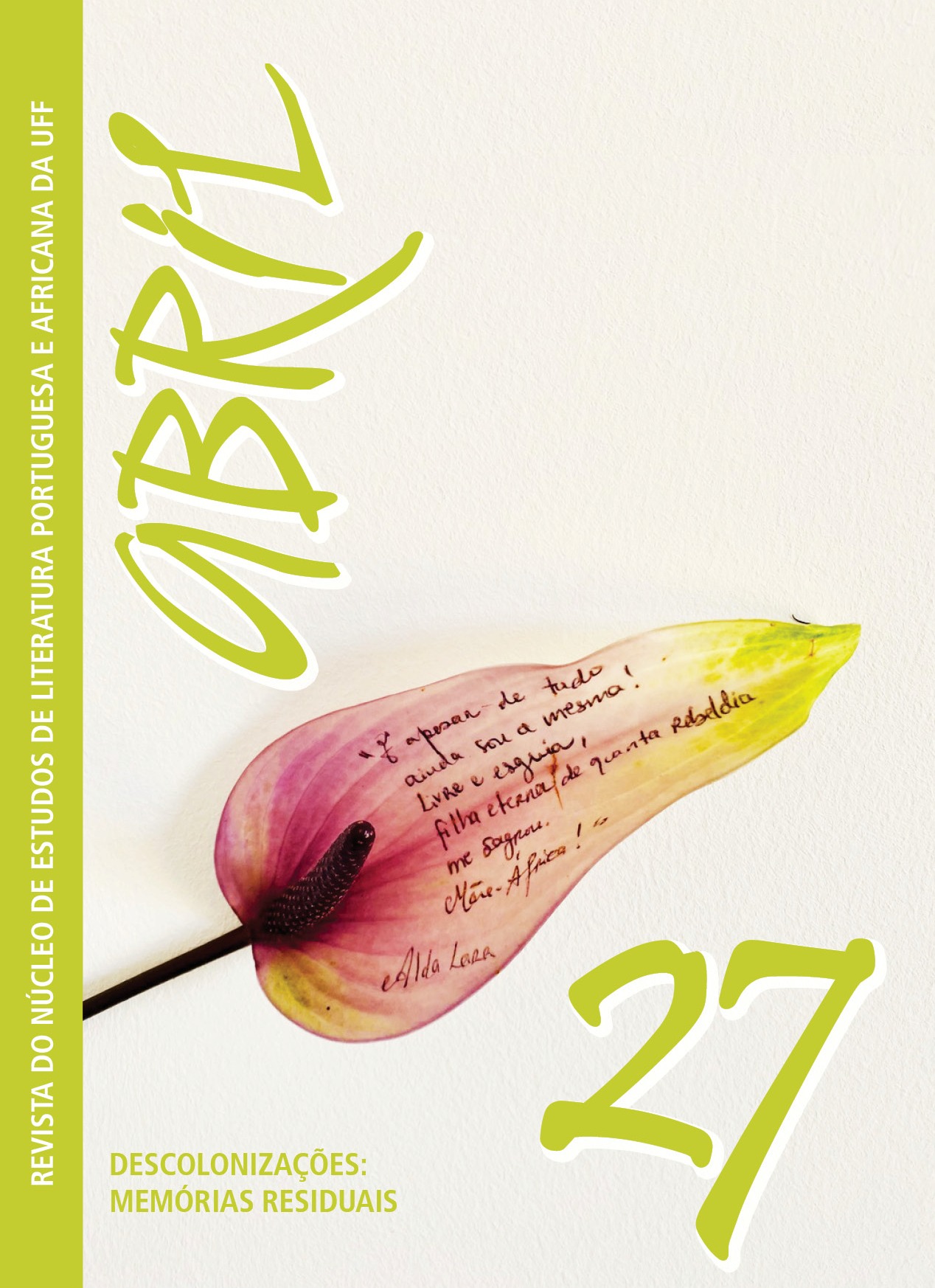Memory’s ransom: silences, postmemory, cinema
DOI:
https://doi.org/10.22409/abriluff.v13i27.51241Keywords:
Postmemory, Film, Silence, Revolution, Colonial WarAbstract
Close to half a century after their end, the colonial wars Portugal waged in a desperate and doomed attempt to hold on to its African colonies in 1974 remain still largely unprocessed. This article examines the multiple silences surrounding the colonial wars and the 25th April Revolution in Portugal drawing from the concept of postmemory and the notion of a traumatic past whose wounds have never healed. It argues that silence in the end does nothing more than allow those open wounds to go on festering. The combined silence over the dictatorship and the colonial wars was never more than a mild palliative, yet another self-delusion the nation allowed itself as it attempted to put on its new European costume. The article focuses on two films, Inês de Medeiros’ Cartas a uma Ditadura (2006) and Ivo M. Ferreira’s Cartas da Guerra (2016), their differences and their similarities, singling out the work of postmemory evident in the scenes with Belmira Monteiro and her granddaughter in the former.
---
Original in English.
Downloads
References
BOTELHO, JOÃO. Realizador. Um Adeus Português. Portugal, Produções OFF, 1985. DVD, Zon Lusomundo, 2008.
CARDOSO, MARGARIDA. Realizadora. A Costa dos Murmúrios. Portugal: Filmes do Tejo et al. DVD. Atalanta Filmes, 2004.
CÂMARA, VASCO. “Cartas da Guerra. Um filme que se ergue”. Ípsilon, Público 1 de Setembro de 2016. https://www.publico.pt/2016/08/24/culturaipsilon/critica/nao-e-voz-off-e-voz-in-a-procura-de-um-lugar-out-1742132.
COPPOLA, FRANCIS FORD. Realizador. Apocalypse Now. United Artists and Zoetrope, 1979.
DE MENESES, ALISON RIBEIRO. “Affect and the archival turn: Documentaries by Inês de Medeiros and Susana de Sousa Dias”. Women’s Cinema in Contemporary Portugal.
LIZ, MARIANA e OWEN, HILARY (Orgs.), New York: Bloomsbury Academic, 2020, pp. 150–168.
ENCARNACION, OMAR G. “History, Politics, and Forgetting in Spain”. Democracy Without Justice in Spain. Philadelphia: University of Pennsylvania Press, 2014. pp. 27-49.
FAULKNER, WILLIAM. Requiem for a Nun, London: Vintage, 2015.
FERREIRA, ANA PAULA. “Home Bound: The Construct of Femininity in the Estado Novo”. Portuguese Studies 12, 1996, pp. 133-144.
FERREIRA, IVO M. Realizador. Cartas da Guerra. Portugal: O som e a fúria, 2016. DVD: Alambique.
FOUCAULT, MICHEL. The History of Sexuality. Volume 1: An Introduction. Tradução: Robert Hurley. New York: Pantheon Books, 1978.
HIRSCH, MARIANNE. The Generation of Postmemory: Writing and Visual Culture After the Holocaust. New York: Columbia University Press, 2012.
HUYSSEN, ANDREAS. Present Pasts: Urban Palimpsests and the Politics of Memory. Stanford: Stanford University Press, 2003.
JAMESON, FREDRIC. Valences of the Dialectic. London: Verso, 2009.
JORGE, LÍDIA. A Costa dos Murmúrios. Lisboa: Dom Quixote, 1988.
LOBO ANTUNRES, ANTÓNIO. Memória de Elefante. Lisboa: Editorial Vega, 1979.
LOBO ANTUNES, ANTÓNIO. Os Cus de Judas. Lisboa: Editorial Vega, 1979. The Land at the End of the World. Tradução: Margaret Jull Costa. New York: W. W. Norton & Co., 2012).
LOBO ANTUNES, ANTÓNIO. D’este viver aqui neste papel descripto. Cartas da guerra. Eds. Maria José Lobo Antunes and Joana Lobo Antunes, Lisboa: Edições Dom Quixote, 2005.
LOFF, MANUEL. “Coming to Terms with the Dictatorial Past in Portugal after 1974: Silence, Remembrance and Ambiguity”. SACHSE, CAROLA and WOLFRUM, EDGAR (Orgs.). Diktaturen und ihre Überwindung im 20. Und 21. Jahrhundert. Vol. 5: Postdiktatorische Geschichtskulturen im Süden und Osten Europas. Bestandsaufnahme und Forschungsperspektiven. TROEBST, STEFAN (Org.) with contribution by BAUMGARTL, SUSAN. Göttingen: Wallstein Verlag, 2010. pp. 55-121.
MEDEIROS, INÊS DE. Realizadora. Cartas a uma ditadura. Portugal, Faux, 2006. DVD.: Alambique.
MEDEIROS, PAULO DE. “Until the End of the World”. Bulletin of Hispanic Studies 85, 2008, pp. 201-213.
MEDEIROS, PAULO DE. “Herança de sombras. Memória, Pós-Memória e Responsabilidade em ‘Os Memoráveis’ de Lídia Jorge”. Colóquio-Letras 205: 2010, pp. 79-97.
MEDEIROS, PAULO DE. “Post-imperial Nostalgia and Miguel Gomes’ Tabu”. Interventions, 18:2, 2016, pp. 203-216.
OLIVEIRA, MANOEL DE. Realizador. Non, ou a Vã Glória de Mandar. Portugal, Madragoa Filmes et al., 1990.
NAGIB, LUCIA. “Colonialism as Fantastic Realism in Tabu”. Portugal’s Global Cinema. LIZ, MARIANA (org.). London: Bloomsbury, 2018, pp. 223-238.
RIBEIRO, MARGARIDA CALAFATE. “A Casa da Nave Europa – miragens ou projeções pós-coloniais?” Geometrias da memória: configurações pós-coloniais. RIBEIRO, ANTÓNIO SOUSA e RIBEIRO, MARGARIDA CALAFATE (Orgs.). Porto: Afrontamento, 2016. pp. 15-42.
SARLO, BEATRIZ. Tiempo Pasado: Cultura de la memoria y giro subjetivo. Una discusión. Buenos Aires: Siglo XXI Editores, 2005.
SOUTO, MARIANA. “Susana de Sousa Dias and the ghosts of the Portuguese dictatorship”. Comparative Cinema. Vol. III, 6, 2015, pp. 46-49.
VARELA, RAQUEL. A People’s History of the Portuguese Revolution. Tradução: Sean Purdy. London: Pluto Press, 2019.
Downloads
Published
How to Cite
Issue
Section
License
Copyright (c) 2021 ABRIL – NEPA / UFF

This work is licensed under a Creative Commons Attribution-NonCommercial 4.0 International License.
I authorize the journal Abril - NEPA/UFF to publish the paper of my authorship/responsibility that I now submit, in case it is accepted for online publication.
Moreover, I declare that this contribution is original, that it was not submitted to any other editor for publication, and I sign the present declaration attesting the truth of all its contents.
The copyright of the works published at the virtual space of the journal Abril - NEPA/UFF are automatically entitled to the journal. Their total or partial reproduction is conditioned to the authors' citations and publication data.

Abril is licensed under a Creative Commons - Attribution-NonCommercial 4.0 International (CC BY-NC 4.0).









